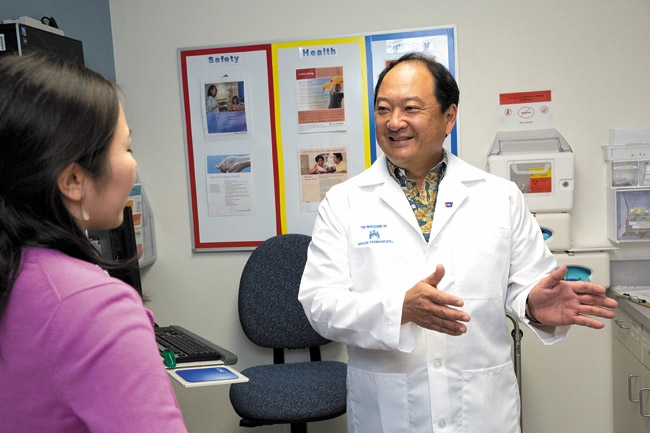Making Strides Against Cancer
Dr. Daryl H. Kurozawa
President of the Board of Directors, American Cancer Society Hawaii Pacific
What background career experience led you to work with American Cancer Society?
My early exposure to American Cancer Society (ACS) occurred while I was in my general surgery residency at Oregon Health Sciences University. My research year in surgical cancer care was supported through an ACS research fellowship grant.
mw-dih-drdarylkurozawa-2
In 1994, I returned home to Hawaii to practice in general surgery. American Cancer Society played a vital role in supporting my cancer patients from the time of diagnosis through their recovery.
My volunteer work with American Cancer Society began with Relay for Life. Our team, named “Surgeons for Life,” included our patient cancer survivors. The relay gave our patients and their families a time to celebrate life. My best memory of Relay is of a breast cancer survivor and her daughters walking the track in the solitude of the evening. The time spent at Relay gave them a time to heal and to offer hope.
In partnership with the ACS, I have co-directed the annual West Hawaii Cancer Symposium. The meeting is a multidisciplinary medical education meeting designed to provide a venue where national cancer experts can interface with our health care providers in Hawaii.
How long have you been with ACS and how long have you been board president?
I began as a volunteer for American Cancer Society through Relay for Life in 1995. I have had the privilege to serve on the ACS West Hawaii Board of Directors from 1996 to 2004 and on the ACS Hawaii Pacific Board of Directors since 2003. I am currently the president of the ACS Hawaii Pacific board. I also serve on the American Cancer Society High Plains Board.
What do you do in your role as board president?
The ACS Hawaii Pacific Board includes both medical and lay members. As board president, I act as the medical liaison to the board. Along with the other physician members of the board, we offer advice and guidance on medical related issues. My role also is to serve as spokesman for print, radio and television media.
With 2013 marking 100 years of ACS, what are some of major advances that have taken place over the years?
We were excited to celebrate our 100th birthday last year. American Cancer Society was founded by 15 New York businessmen and physicians May 22, 1913. Although it was a time when no one spoke about cancer, this group of bold pioneers embarked on a mission to create awareness about cancer. Through their work, ACS has grown into the largest volunteer health organization with more than 3 million volunteers.
Since 1991, we have seen a 20-percent decline in cancer death rates and a 50-percent drop in smoking rates in the United States. The improvement in cancer survival is related to three areas supported by ACS: 1) advances in cancer treatment 2) tobacco cessation and 3) screening/prevention.
Tobacco cessation through the work of ACS has played a major role in the decline in cancer deaths.
Screening and prevention also has a major effect in improving the decline rate in cancer deaths, such as with breast cancer and mammography.
American Cancer Society has placed a focus on colon cancer. Colon cancer is the second leading cause of cancer death in both men and women. Nationally, ACS has set a goal to screen 80 percent of adults for colon cancer by 2018. We will be working with our Hawaii care delivery leaders to improve on our screening and prevention measures.
Much of the improvement in cancer survival is also related to cancer research. ACS is the nation’s largest, private, not-for-profit investor in cancer research. So far, ACS has funded 47 researchers who have gone on to win the Nobel Prize for their work.
Here are a few landmark dates: 1) First successful chemotherapy: 1947 2) ACS pushes for widespread adoption of the Pap test: 1948 3) ACS proves scientifically the link between smoking and lung cancer: Late 1950s 4) ACS invests in a mammography study demonstrating that mammography is the best tool for early detection of breast cancer: 1973 5) ACS confirms a link between obesity and many types of cancer: 2003 6) ACS celebrates 1.2 million lives saved from cancer research between 1991 and 2009, a 20-percent decline in the cancer death rate.
What’s new with ACS-Hawaii?
American Cancer Society Hawaii Pacific is in the process of building a Hope Lodge in Honolulu (the Hope Lodge campaign recently was featured in Mid-Week). The Hope Lodge will offer free housing for cancer patients and one companion while they are in Honolulu for treatment. I anticipate that the lodge will be a welcome resource for the many patients who need to travel to Honolulu from Neighbor Islands for their cancer care. It will be a great service at a time when patients and their families are at the greatest need for assistance. The Honolulu Hope Lodge is projected to begin construction in May.
Anything else you’d like to add?
American Cancer Society continues to serve cancer patients through services such as Reach for Recovery, I Can Cope, Look Good Feel Better and patient navigation. Activities planned for this year include Relay for Life events and Making Strides here in Honolulu. For information or assistance, help is available 365 days a year, 24 hours a day at 1-800-227-2345, or visit our website at cancer.org.
rfournier@midweek.com






